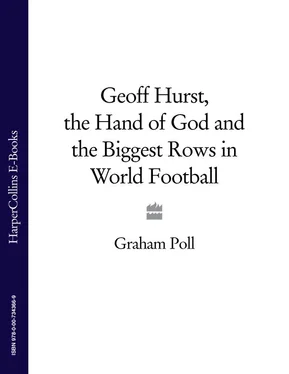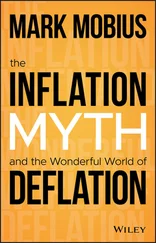But, for now, just let’s say that I certainly expected help from the Fourth Official if something difficult happened in my matches. I didn’t always get that help, but there you go. Anyway, if I had been confronted by a ‘goal’ like Hurst’s, I would walk very, very slowly towards the assistant referee and say, ‘Did anyone else get a view?’ With that cue, I would expect the Fourth Official urgently to seek a video replay. Then he would say, ‘You can’t tell Pollie.’ Or, more likely, he would say, ‘It’s on the line Pollie. No goal.’ That might not be legal, but it would ensure natural justice was served. Sorry, Sir Geoff. Sorry, England.
That is what a referee who took charge of World Cup matches in 2006 would have done in 1966, but Gottfried Dienst was the best referee of his day, because he was given the World Cup Final. And he did what all referees of that era would have done. So I am not criticizing him at all. I am not in a position to, am I?
As for our mate Bakhramov, well, the Germans have two versions of events. In one, they say that he claimed he thought Hurst’s shot had hit the roof of the net (rather than the bar) before bouncing down. If that is true, then his eyesight was rubbish but there is no evidence that he said that and I don’t think it is plausible that he did. It is much more likely that in the split second he had, and from the angle he had, he thought the ball had bounced down overthe line. I am sure there must have been doubts in his mind. So he should not have said, ‘Ye-es’. He should have said ‘No-o’.
The second German legend is that, when Bakhramov was on his deathbed (he died in 1993) he was asked how he was sure the ball had crossed the line and is said to have replied, ‘Stalingrad’ (a reference to a bloody conflict in the Second World War—in which Germany laid siege to a city in the Soviet Union and there were tens of thousands of civilian casualties). The mere word ‘Stalingrad’ had a deep resonance for anyone from the old Soviet Bloc. The allegation is that Bakhramov was gaining revenge for his people. Again, there’s no evidence that Bakhramov said that and I refuse to believe it.
As someone who was often enraged by unfair allegations about my refereeing, my instinct is to find Bakhramov innocent of German accusations of incompetence or deliberate unfairness.
What I do concede is that there is often a subconscious, subliminal tendency to favour the home team. Deep inside your brain, there is a little half-thought that giving a big decision against a noisy home crowd is difficult. Sometimes in those circumstances you hesitate, just momentarily. And once you have hesitated, you have effectively decided not to give the decision. Referees don’t admit to the general public that this happens but it is only human nature. Good referees acknowledge this subliminal process and guard against it. Was Bakhramov proficient enough to ignore the pressure of the circumstances? Almost certainly not. With England playing at Wembley in the World Cup Final it would have been extremely difficult to give a goal againstthem if the ball bounced down from the crossbar. But it was relatively easy for Bakhramov to give the goal forEngland. I don’t think he was deliberately biased. But it is possible he might have suffered from an unintentional, subconscious bias.
One conclusion about 1966 springs from the lack of dissent shown after Bakhramov’s momentous decision. He said it was a goal and, because there were no slo-mo replays, nobody knew any different. It was assumed that the linesman (and the referee) were right. Their decisions were final and were respected. Now, all close calls are disputed and the assumption is that the officials are wrong.
It would be a good thing if more people could remember that, down on the pitch, when nobody knows for certain what happened, everyone has to rely on a neutral arbiter: the ref or his assistant.
Another conclusion to be drawn from the 1966 goal is that some things have improved. As we have seen, language difficulties have been eradicated, specialist assistant refs are used, teams of officials come from the same country and are familiar with working with each other, they are ‘wired for sound’ and instructions to assistants have improved.
But the most worrying conclusion is that it could happen again. A World Cup Final could be decided by a ‘goal’ that is not a goal.
I’d like to think that I, or any modern, experienced, competent referee, would have helped to prevent the assistant from making such an obvious mistake. But you cannot rule out a similar, less blatant error without technology that accurately determines whether the ball has crossed the goal-line. Without technology, it will always be guesswork and there will always be wrong guesses. So, without question or quibble, football should develop and embrace goal-line technology.
As a referee or assistant, you make hundreds of judgements during a game and many of them are only opinions. Did that player handle the ball deliberately? Was that tackle reckless? All you can do is make an honest assessment and give your opinion. If, after the game, you find that some people—perhaps even most people—disagree with your opinion, that’s up to them. You can still travel home content in the knowledge that all you did was give the best opinion you could in the circumstances.
But you also have to make judgements on matters of fact. Was that foul inside the penalty area? Did that shot cross the line? You can be proved right or wrong by television cameras—and if you get a big call wrong, you drive home cursing yourself. Football is about goals, so the biggest call you can make is whether a goal has been scored legitimately. If you get one of those calls wrong, it can eat away at your mind as you drive home.
The two rugby codes, Union and League, use video replays to decide whether tries have been scored legally. Cricket uses video replays for run-outs and has started using the Hawk-Eye computer system when there is an argument about whether the batsman was ‘leg before’ and when a ‘caught behind’ is disputed. Tennis adopted the Cyclops system of judging line calls, and then moved on to use of Hawk-Eye. I did some research on the tennis system for the BBC and found it fascinating that the players accepted Hawk-Eye was not always right. They accepted a certain degree of error from a machine.
Meanwhile, of all the major sports, only football refuses to use technology to solve disputes. We’ve done everything else that is possible, but not the one thing which would prevent mistakes. Nearly every referee I know would welcome accurate, efficient goal-line equipment—a ‘beep’ that announces, yes, the ball crossed the line. Only then could we be sure that a mistake as important as the one that allowed Hurst’s goal to stand would not be repeated.
Without video technology, it is always possible a mistake will be made, and if an assistant referee says he is 100 per cent convinced that the ball has crossed the line, you have to take him at his word and award the goal. A referee has to rely on his assistants and, as old Bakhramov demonstrated all those years ago, sometimes assistants do funny things. As further proof of that, I’d like you to think about a highly contentious incident in the 2008/09 English season. Actually, no, it was not contentious because everyone knows what happened. Inexplicable is a better word. Inexcusable is another one.
On 20 September 2008, a very young referee, Stuart Attwell, awarded a goal to Reading at Watford in the Football League’s top division. His assistant, Nigel Bannister, signalled the goal but should have flagged for a corner.
In the Laws of Football, which are set by FIFA, the game’s world governing body, number ten deals with ‘The Method of Scoring’. It states, ‘A goal is scored when the whole of the ball passes over the goal line, between the goalposts and under the crossbar…’ So the incident had ticked some of the boxes—but not the important bit about between the goalposts! Bannister had been instructed to signal only for things about which he was absolutely certain. He had been told not to ‘see’ things that hadn’t happened. Yet Bannister was convinced that he’d seen a goal scored. For whatever reason, he just had an aberration. When Attwell went over to talk to him, there was confusion between them about the specific moment to which Bannister was referring, but he was a very experienced assistant and he was adamant that a goal had been scored, so the inexperienced Attwell was persuaded by the older man’s certainty.
Читать дальше












